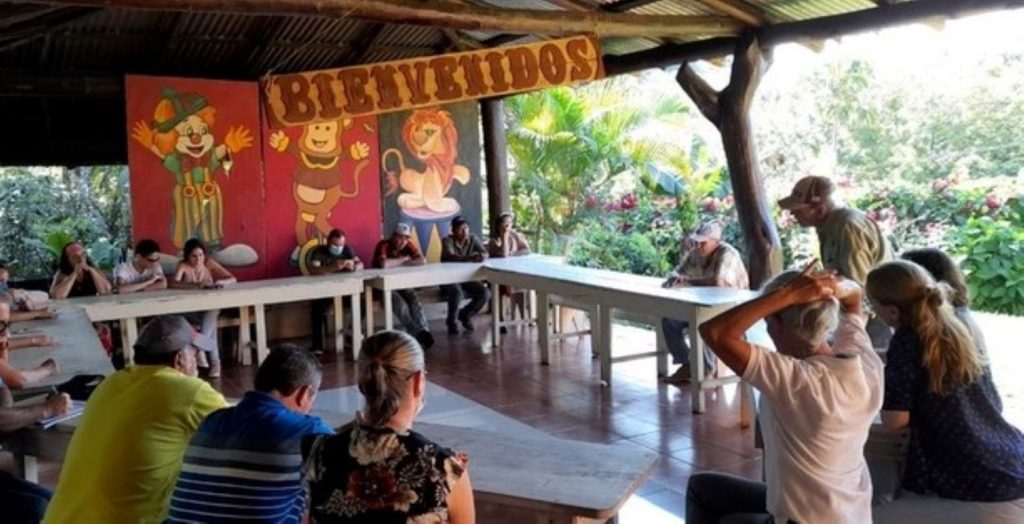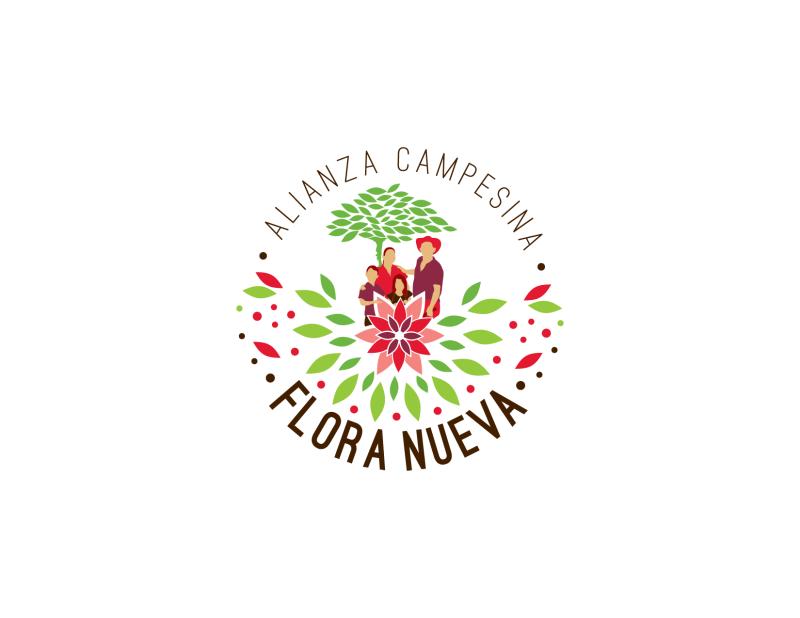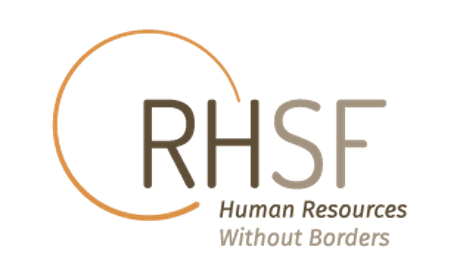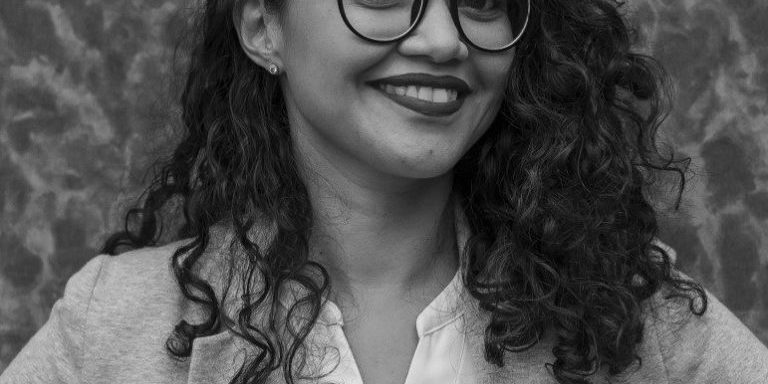Interview of Paulina Torres Mora, field project manager for RHSF
Published on Oct 13, 2022
Costa Rica, a new field of experimentation for RHSF
The projects co-funded by the French Development Agency (AFD) required a continuous presence on our experimental sites. For the Costa Rica project, RHSF opted for a pair. Estelle Eeckeman brings her extensive experience of the RHSF methodology from Toulouse with regular on-site immersions. A new team member has joined RHSF to live as close as possible to the community: Paulina Torres Mora.
After a few months of immersion, we asked Paulina about her unique experience in the field: How to coordinate dialogue between producers, workers and their families, but also companies to build new responsible practices?
You joined RHSF, as field project manager in Costa Rica, last February. We would like to know more about you! What’s your background Paulina?
I live in the community today for the project with RHSF. I’m a sociologist. I have broad fieldwork & theoretical knowledge and I think that my principal asset is popular education. I obtained a Master degree in Rural Education and then worked at the Vicerrectoría de Extensión Social at the National University of Costa Rica.
Over the years, I’ve contributed to diverse projects linked to vulnerable people and children in urban and rural contexts. I’ve lived and worked with different communities! We experimented different approaches to answer specific child needs. For example, during six years, as part of the project called “Stop exclusion, create value”, we created different tools for young people to have a better access to work, without dropping out of education.
So today, I’m happy here. I live with a very isolated coffee farming community. My role is to coordinate with all local stakeholders, identify their needs and discuss a decent and sustainable way forward for producers, workers and their families. In parallel, I continue to work at the National University, in touch with the academic community.
You have had many opportunities to live with various communities throughout Costa Rica as well as to study their cultural attributes. Could you share with us your experience of the vulnerability of people in Costa Rica?
I was a teacher with so many different people. I visited many rural communities in the country, and I could witness their different realities.
I also contributed to different research programmes to ensure affectivity and sexuality program elaborated by the Ministry of Education are culturally relevant for the entire population, especially indigenous people. Specifically, for a United Nations Development Programme, I investigated in alliance with the Ministry of Education of Costa Rica how they could make the sexuality education programme in high schools more culturally relevant in the many indigenous communities. With a specialised team, we had to take into consideration that indigenous communities have different perspectives, languages and cultures on this topic than Western societies. The Ministry needed a specific sensibility to approach the subject with many more concepts and perspectives.
As a sociologist, as a teacher, as a contributor to action researches, I had the opportunity to approach education in critical ways. They were all unique experiences. They allowed me to have an opened vision about the topic. While discovering the many different contexts in Costa Rica, I’ve learned how to work with the different communities. I think my strongest asset is my sensibility to work with people.

According to you, what’s the economic and social contexts in Costa Rica? What are the risks for the most vulnerable people?
People here live with limitations. I saw the different social classes, and how so many people have difficulties. The poverty is different here. For example, most people don’t have money to buy expensive stuff, but they have food. If they have children, they go to the school.
The farmers of this community, for example, are organized very well. Even if they have needs, they give to each other whatever they produce. That’s beautiful. People here help each other. It’s different from living in urban reality, where people are more stressed and closed.
Costa Rica is different from other countries in Central America. We have a good Human Development Index. The Ministry of Labour produces many laws that protect workers. One of the problems is when people work informally. This can take many forms in Costa Rica… Then, people become invisible and have no social security.
And there are a large number of people working informally.
Let’s take agriculture: At this moment, all products necessary to run a farm are very expensive. Farmers have to sell their oranges, for instance, at very low price, so they feel that their work isn’t valued. Farmers don’t know how to do, they think that agriculture is not sustainable. So, they don’t see how they could pay social security to workers, and they also hire fewer day labourers. To the lack of decent working conditions, you add the lack of job security.
In Costa Rica, coffee cultivation in large farms relies on the Nicaraguans who cross the border for the coffee harvest (October to February). Migration being such a burden, the large majority of them come irregularly.
We have so much informal work here for migrant people. And since they are in an irregular situation, they are paid poorly. Migrant people and poor people have no other choice and become vulnerable to any abusive work conditions.
Again, according to you, what’s the uniqueness of RHSF’s approach to prevent indecent work conditions?
My first question at the interview with RHSF was “what’s your timeline for this project?”
I wasn’t interested by a short-term project. I wanted to have the time to get involved with people and create strong relationships with them. Universities have limited resources to finance projects in the long run. I believe, with RHSF, I can do more in-depth local outreach work.
What I like most about this project is that it is experimental. In this context, I have the peace of mind to do quality work. The most important thing is to listen to the people. This is the best approach to identify new ways of working and responsible practices sustainable for all stakeholders: workers, farmers, cooperative, purchasing companies and consumers. In the light of the results that we achieve in the field, we will make the necessary adaptations to the project and come up with new practices beneficial to all.
As a sociologist, specialized in education, what levers have you identified in the field?
First, I think this community is very special. Their organizational skills are spectacular. They are very isolated. I see it as an opportunity to find a solution all together. I think there are three leveraging axes.
The first one is to find the way to attract young people in the agriculture: how to make them feel proud about the agriculture, how to make them understand the agriculture history of the community, how to make them change their perspective. Up to now, they just hear the older generation say “it’s very hard and it’s not sustainable…” Young people have different interests. I try to understand them. I think I will achieve something if I can make young people take a critical look at the global world and make them see the value of this country.
The second one is to protect everyone from different labour risks in coffee, and show people the benefits of working in agriculture.

Thirdly, these first axes will only be reached if they are integrated in the global framework including both a sustainable business model and responsible agricultural practices in cooperation with the entire coffee industry. This work is driven by our local partner, Alianza Campesina Flora Nueva, and based on the lot of knowledge and experience that producers have here.
Overall, these three axes aim at assuring decent work for all in the community. This is our strategy to reduce the risks of child labour and forced labour.
On a daily basis, what are the most useful skills and the most regular activities you leverage to coordinate the project?
I conduct meetings with the different people in the community because we need everyone to work together at the end: It’s a big challenge for the community!
It is also very important to be part of the social life of the community and to come with exciting and adapted activities. It is a great way to build up trust. I ensure to make it easy to bring people together.
Of course, I also work weekly with the key actors of the project: the local cooperative and our local partner Flora Nueva. Face-to-face meetings are very strategic to go in-depth with our project ensuring on a common understanding of the issues as well as alignment on the way forward toward more responsible practices.
In addition to the project coordination, I use my academic skills and experiences to the definition of the educational program dedicated to agriculture for young people. I also do research work on the best approach for our participative action research processes.
My strategy is that, whether RHSF is there or not tomorrow, there are things that need to be articulated to generate sustainability. We have public institutions, some resources, so there is a chance for things to work out. It is important that all actors understand and adhere to the project and accept to play their part in the evolution. So even if the project leaves, some things must continue to work for young people, workers and producers.



